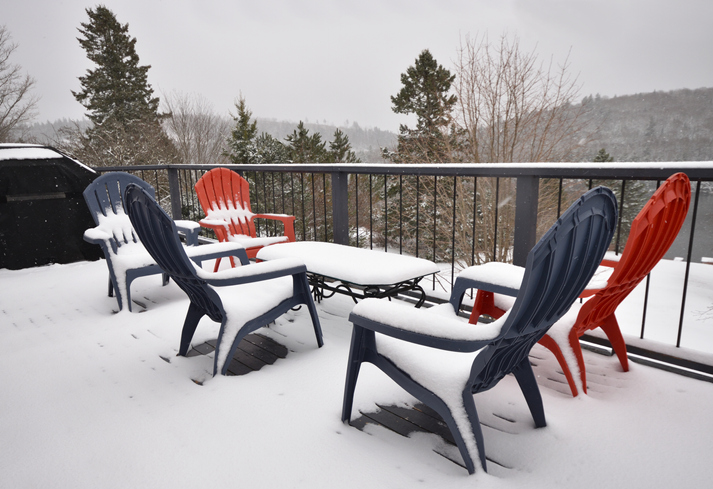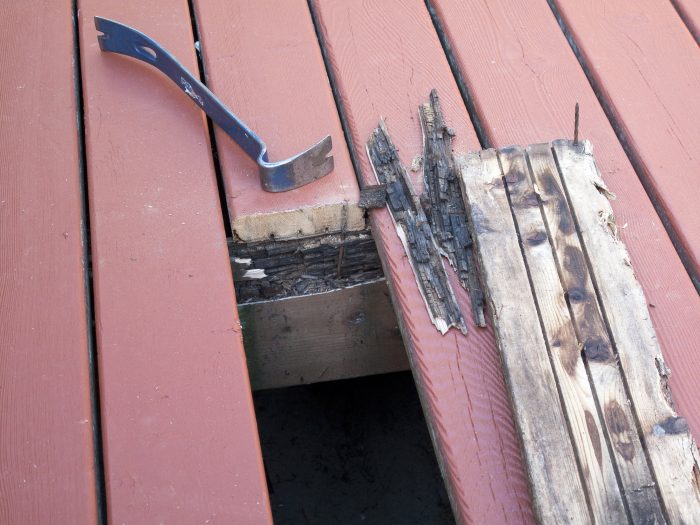5 Reasons Why Vinyl Is the Best Deck Material for Snow-Covered Regions
Have you ever noticed one of the greatest features of snow? It acts as a natural sound absorber. A dark and snowy night can mute the loud noises coming from a busy county road or your neighbor’s home. It’s peaceful and one of the reasons you love living where the snow is.
But snow and cold weather can quietly damage your deck.
To counteract the potential damage and even prevent deck collapse, check out our top 5 reasons why vinyl is the best deck material for snowy regions.

1. You’ll Spend Less Time Preparing for Winter
Many owners of wood decks spend hours preparing for the long, cold winter. Many check their deck posts to examine their stability and to see if there are any signs of rot. Unfortunately, decay is often found at the base of the post.
Decaying wood posts are very dangerous. These posts support the weight of the deck and any added pressure from the snow that accumulates over the winter. All this weight can lead to a deck collapse. So, what should owners do?
Wood decay prompts many owners to completely replace their deck, which costs thousands of dollars. Some will pour more cement at the base. But this fix is short-lived and ultimately can’t stop the spread of the rot.
The best deck material for snow is vinyl for many reasons. The biggest time-saving reason is that vinyl is the easiest material to prepare for extended periods of snowy weather. Winterizing your vinyl deck takes 6 easy steps.
2. Vinyl Won’t Lose Its Color
A helpful step in preserving your vinyl deck’s vibrant color is removing the snow. This is a little trickier with a wood deck.
A plastic shovel can safely remove snow without scratching a vinyl deck. It’s not that simple with wood. A plastic shovel can still shave paint and finish off of wood decks when used for snow removal. Some wood deck owners won’t care because they plan on staining again in the spring.
The problem comes when the snow melts. The unprotected wood absorbs water, becoming weaker and more susceptible to rotting. And when the wood deck owner decides to finish their deck later, it can mask the rotting wood. This will lead to a bigger problem down the road.
Meanwhile, vinyl decking will return to its newly-finished form in the spring. All it will need is a light wash to remove the dirt and grime collected during winter.
3. Vinyl Provides Better Deck Joist Protection
Wood decks may appear strong to the untrained eye. However, there are many hidden areas of a deck that can harbor mold. One of the most common areas where mold thrives is in the joists of the deck.
Joists help support the boards that act as the surface for a deck. As water drains from the boards, it drips underneath the deck where it either falls off or evaporates into the wood, causing mold growth. When mold grows, it weakens the wood.
Another problematic area that harbors mold growth is where the screws are placed to hold the wood together. These screws can rust and become weak. This weakens the joist, increasing the possibility of a deck collapse.
Vinyl decking does not harbor mold. These decks can also be installed screw-free, ensuring rust and mold never combine for an accident. It naturally prevents deck collapse from weak joists.
4. No Localized Board Damage
The first place people will notice damage to their deck is on the surface. It’s a huge target for items falling from the sky like leaves and other debris. Usually, a quick sweep will clear the surface and return it to its natural appearance. It’s not that easy when the wood rots.

One of the reasons a wood plank can become rotten is due to its location on the deck. If an icicle forms from the roof, it can melt and drop its water in the same spot over and over again. The stain can lead to mold, which is impossible to remove unless the entire board is replaced.
Another way this can happen is if there’s a potted plant resting on the surface of the deck. Water can spill over with dirt and create a stain on your deck.
This doesn’t happen with vinyl.
What Is the Most Durable Decking Material?
Vinyl is the most durable decking material because the climate it is installed in doesn’t affect its longevity. It doesn’t corrode like metal or become brittle and weak like wood. Rain, snow or sunshine has little impact on vinyl. That’s why most vinyl decks come with a lifetime manufacturer’s warranty.
5. Best Material to Prevent Deck Collapse
We already touched on how wood post rot can lead to a deck collapse, but there’s another hidden reason why a wood deck can fall down.
Frost heaves can uproot posts from underneath the ground due to the soil freezing and creating pockets of ice in the ground. These naturally occurring heaves make wood decks less stable if they’re located where a post sits in the ground.
The way cement surrounds vinyl deck posts in the ground makes it nearly impossible for frost heaves to threaten vinyl decks.
Vinyl Fence Wholesaler offers the best deck material for snow. Our vinyl decking is the strongest in the industry and manufactured to last a lifetime of winters.
Stop spending time worrying about the stability of your wooden deck and contact our team so you can enjoy next year’s snowfall stress-free.


